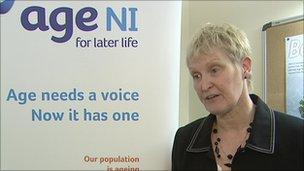Western trust cuts nursing home places
- Published

Chief Executive of AGE NI Anne O'Reilly said social care for older people is in crisis
The number of new nursing home places within the Western Health Trust has been cut to two a month due to a lack of funding.
The BBC has learned that managers of some nursing care homes have been told not to accept any new admissions despite having empty beds.
As a result, some elderly people are being forced to remain in hospital.
In a statement the western trust said the number of places allocated each month is not a set figure.
The statement continued: "Given the financial climate and increasing levels of demand some people are having to wait longer."
The BBC contacted six nursing care homes within the Western Health and Social Care Trust.
Both of the homes said despite having empty beds they had been instructed not to accept any new clients.
One manager, who wished to remain anonymous, said it was "criminal" to be turning people away, especially those who so desperately need proper nursing care.
"I feel incredibly sad when I have to tell families that we cannot help them. In one case, I knew that I was sending an elderly man home to die," the manager said.
"How could his family cope with that, they just wanted to provide care that was dignified. "
In these austere times, the debate is gathering speed as to how, the local Health and Social Care service will be able to look after an ageing population. Last year 23,377 people received a home/domiciliary care package.
With the number of people in Northern Ireland aged over 75 expected to increase by 40% by 2020, those who work in the voluntary sector are asking where and how future care can be provided.
In 2007, the Health Minister, Michael McGimpsey, said he wanted to provide more care out of hospitals and in the community instead.
Adequate
The BBC has learned that as well as having to reduce its number of places in nursing homes, the Western Health Trust has also had to cut back the number of care packages it can deliver in people's homes.
In a statement, a spokesperson said: "The number of places allocated on a monthly basis is not a static figure and does change, depending on each individual client's needs, the availability of placements and on resources to provide those placements. "
Chief Executive of AGE NI Anne O'Reilly said she understood that the figure was two places, which was backed up by the homes she had been in contact with.
"Social care for older people is in crisis," Ms O'Reilly said.
"It is particularly acute in the Western Health Trust where there are only two beds available, that is only two new places for the entire western area.
"Older men and women are having to stay in hospital unnecessarily longer. In some cases they could be cared for in their own home - but there is no one to help them live independently. The move to cut places is just insane. "
Maureen Collins is an outreach advice worker for Dove House in Londonderry.
According to her, carers are stretched trying to see their clients and have been told to cut the 15 minute time slot to just 10 minutes instead.
"I would be saying what domiciliary care packages. They are virtually non-existent in this area. Families are having to step in instead.
"And what can you do in 15 minutes, bathe, feed and then run to the next client. It's totally undignified."
While all Health and Social Care Trusts are struggling with budgets, waiting lists for home care packages within the Western Health Trust are particularly long.
The BBC understands that at one stage last week, up to 15 elderly people were in the Erne hospital who could have been discharged if care had been available in their home.
Mo Henderson has been trying to access care for her elderly uncle for some months.
Ms Henderson said her uncle was admitted to hospital within the Western Health Trust four months ago and cannot go home as there is no home-help available.
"We've had to watch him deteriorate and in an unsuitable environment. He needs 24 hour care and while in hospital he isn't even in a dementia care unit.
"He went in for a minor medical ailment has received numerous hospital acquired infections - we are afraid we are going to lose him in acute care."
Those who work in the independent sector argue they can provide care at home at a much more efficient rate than the health service.
According to Anne O'Reilly from Age NI, it costs £300-a-day to care for an older person in hospital. That compares to £300-a-week in their own home with carers calling twice a day, seven days a week.
"The figures just don't add up. We can provide a good quality 24-hour residential place for around £430 a week - keeping a patient in hospital costs well over £2,000.
"Why isn't that money being transferred from the hospital to the social services sector, it makes sense. "
The issue is to be raised by Sinn Fein in the Assembly later today.
Martina Anderson, MLA is proposing a motion to call on the Health Minister to ensure there is adequate investment to meet the current and future needs of an ageing population.